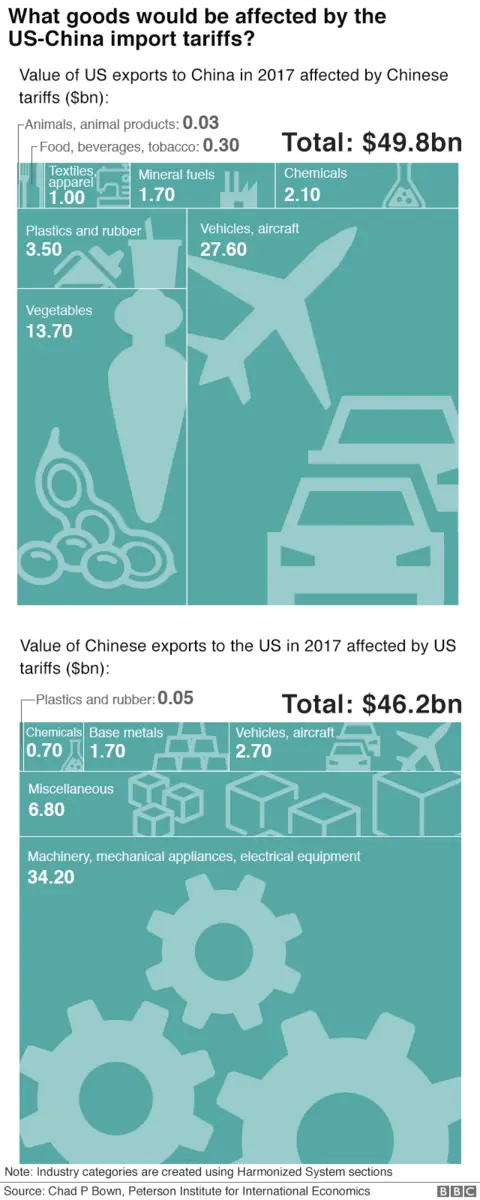Impact Of China's Selective Tariff Exemptions On US-China Trade

Table of Contents
The Rationale Behind China's Selective Tariff Exemptions
China's decision to grant selective tariff exemptions isn't arbitrary; it's a calculated strategy driven by a confluence of factors. The motivations are complex, intertwining domestic political needs with broader geopolitical considerations. These exemptions aren't simply about economic pragmatism; they are also tools of leverage in the ongoing trade negotiations and a reflection of China's evolving trade policy.
- Domestic Economic Pressures: Easing pressure on specific industries vital for domestic consumption is a primary driver. Certain sectors, crucial for maintaining social stability and economic growth, receive preferential treatment to avoid widespread disruption.
- Political and Industry Lobbying: Intense lobbying efforts from both domestic and international businesses significantly influence which products receive exemptions. Companies exert considerable pressure to secure relief from tariffs, impacting the selection process.
- Maintaining Supply Chains: Ensuring the stable flow of essential goods is a key strategic consideration. Exemptions for vital components or raw materials help maintain uninterrupted supply chains, protecting domestic industries and consumers.
- Geopolitical Signaling: Granting exemptions can also be interpreted as a signal of willingness to negotiate and compromise, potentially easing tensions and fostering a more conciliatory atmosphere in the ongoing US-China trade war.
Impact on Specific US Industries
The impact of China's selective tariff exemptions on US industries varies considerably. Some sectors have benefited significantly, while others have felt the pinch despite the exemptions. This disparity highlights the uneven distribution of benefits and the complexity of assessing the overall effect.
- Agriculture: The impact on soybean exports serves as a telling case study. While some exemptions offered relief, the overall impact on the agricultural sector remained complex, with fluctuating prices and market share shifts.
- Manufacturing: Manufacturing sectors experienced a mixed bag, with some benefiting from exemptions for specific components while others continued to struggle with tariffs on finished goods. The long-term competitiveness of affected industries remains a key concern.
- Technology: The technology sector has faced unique challenges due to the strategic nature of the industry. Exemptions, while offered in some areas, have not fully offset the broader negative impacts of the trade war and the resulting economic sanctions. The analysis of changes in trade volume for specific technological products reveals a nuanced picture.
The Broader Economic Implications
The implications of China's selective tariff exemptions extend far beyond specific industries, impacting the overall US-China trade deficit and global economic stability.
- Trade Deficit: While some exemptions have reduced the trade deficit slightly, the overall impact remains limited. Quantitative analysis of changes in trade volume shows that the impact is not uniform across all sectors.
- Global Supply Chains: The exemptions have influenced global supply chains, causing shifts in investment flows and production locations. This has created uncertainty for businesses worldwide, impacting market sentiment and investor confidence.
- Future Trade Negotiations: The strategic use of exemptions has implications for future trade negotiations. They serve as a tool for leverage, influencing the bargaining power of both sides and shaping the future trajectory of US-China trade relations.
Future Outlook and Policy Recommendations
Predicting the future trajectory of China's tariff exemption policies is challenging, given the inherent unpredictability of US-China trade relations. However, certain trends are discernible. The US government needs to adopt a strategic response that addresses the complexities of this evolving situation.
- Increased Transparency: Greater transparency and predictability in China's trade policies are crucial for businesses to make informed decisions and plan for the future. This requires proactive measures from both sides.
- Strengthening US Competitiveness: The US needs to strengthen its competitiveness in sectors affected by the trade war, investing in innovation and workforce development. This includes streamlining regulations and fostering a more supportive business environment.
- Promoting Fair Trade: Promoting fairer and more reciprocal trade practices is essential for a sustainable and balanced relationship. This requires international cooperation and a commitment to enforcing existing trade agreements.
Conclusion: Understanding the Impact of China's Selective Tariff Exemptions on US-China Trade
China's selective tariff exemptions have significantly impacted US-China trade, creating a complex and dynamic landscape for businesses and policymakers. Understanding the rationale behind these exemptions, their effects on specific industries, and their broader economic implications is vital for navigating this evolving relationship. The future trajectory of US-China trade remains uncertain, highlighting the need for continued vigilance and proactive engagement. Stay informed on developments in US-China trade and China's tariff policies to effectively navigate this critical area. Further research and engagement on this topic are encouraged to foster a more informed and strategic approach to managing this crucial aspect of the global economy.

Featured Posts
-
 Red Sox Lineup Adjustment Coras Game 1 Strategy
Apr 28, 2025
Red Sox Lineup Adjustment Coras Game 1 Strategy
Apr 28, 2025 -
 Will Espns Red Sox 2025 Prediction Come True
Apr 28, 2025
Will Espns Red Sox 2025 Prediction Come True
Apr 28, 2025 -
 Free Live Stream Blue Jays Vs Yankees Mlb Spring Training Game March 7 2025
Apr 28, 2025
Free Live Stream Blue Jays Vs Yankees Mlb Spring Training Game March 7 2025
Apr 28, 2025 -
 Red Sox Doubleheader Coras Lineup Decisions
Apr 28, 2025
Red Sox Doubleheader Coras Lineup Decisions
Apr 28, 2025 -
 Gpu Prices Soar Are We Facing Another Crisis
Apr 28, 2025
Gpu Prices Soar Are We Facing Another Crisis
Apr 28, 2025
